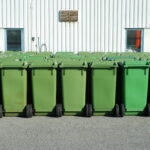The following is a list of additional reuse resources. Please make sure to connect with your reuse outlet to make sure they will accept what you have before you deliver it. Materials Exchanges Materials Exchanges create an interactive relationship between two parties, set up by a facilitator, or an online database. Material descriptions, quantities &…
The Massachusetts Clean Energy Center (MassCEC) is accepting grant applications through the Commonwealth Organics-to-Energy Program. The grant applications are for “Pilot” and “Implementation” projects. These projects are to support the use of anaerobic digestion and other technologies that convert source-separated organic waste into electricity, thermal energy, and compressed natural gas fuel. Qualified applicants can receive…
The Boston Globe recently highlighted the efforts of Spoiler Alert and the Greater Boston Food Bank (GBFB) to rescue surplus food. In September, approximately 11,000 organic eggs were donated to the Greater Boston Food Bank. GBFB used Spoiler Alert to send an alert to connect the near-expiration eggs to a Salvation Army community center to…
A recent BioCycle article describes the results of the Massachusetts Department of Environmental Protection’s (MassDEP) report on the Commercial Food Waste Ban. The MassDEP report, conducted by ICF International, Inc. of Cambridge, studied the economic development benefits of the ban and the waste reduction initiatives. In October 2014, MassDEP implemented the Commercial Organics Waste Ban,…
Clark University is a private institution in Worcester with over 3,000 students, faculty, and staff. Through dedicated leadership and Sustainable Clark, the university has engaged the campus community in a variety of waste diversion programs. In addition to running a comprehensive recycling and composting program, Clark continually re-evaluates their waste programs by identifying opportunities to…
The new Massachusetts Department of Environmental Protection (MassDEP) Reduce & Reuse (R&R) working group hosted a kickoff meeting on March 4, 2020. The group was established to assist in the development of a MassDEP Strategic Reduce and Reuse Action Plan, as outlined in the 2030 Solid Waste Master Plan. The working group is open to…
During a time when the foodservice industry is experiencing thinner margins and altered operations, reducing food waste can support businesses as they adjust. According to a The Business Case for Reducing Food Loss and Waste: Restaurants, each dollar invested in solutions for kitchen food waste can result in an average of a seven dollar return…
On November 10, RecyclingWorks in Massachusetts (RecyclingWorks) hosted the Fall 2020 WasteWise Forum Webinar in collaboration with the Massachusetts Department of Environmental Protection (MassDEP) and the U.S. Environmental Protection Agency (EPA). This year’s fall forum focused on strategies for businesses and institutions that help maximize food waste diversion, with presentations from the Massachusetts College of…
Although not accepted in typical residential or commercial single stream recycling programs in Massachusetts, plastic beer can toppers are often labeled with a recycling symbol that can be misleading for beer drinkers in the state. While some companies collect and reuse these can toppers, the reuse and recycling infrastructure for this material is still nascent.…
Good Filling, a Boston-based company that sells refillable home-care and personal-care products, was recently awarded a Massachusetts Department of Environmental Protection (MassDEP) Reduce, Reuse, Repair Micro-Grant. These grants can be up to $5,000 and are awarded to for-profit and non-profit organizations, as well as eligible municipalities, for short-term waste reduction projects. Good Filling will be…

